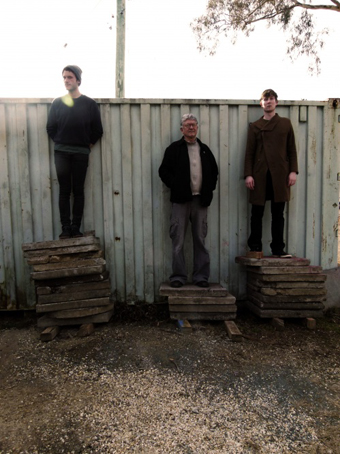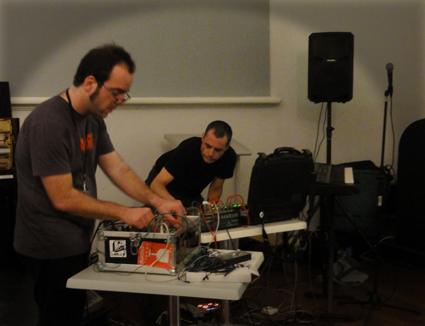 |
Pollen Trio courtesy the artists |
For the second of TURA’s Club Huge events, the PICA bar was home to a cross-section of the new music community with the performers and audience traversing a variety of ages, backgrounds and artistic spheres. The difficulty then is in finding a shared language with which to communicate across this musical Babel. The two acts of the night, free improvisers Pollen Trio and noise junkies Anthony Pateras and Malcolm Riddoch adopted separate but interesting stances on this pursuit of a musical language.
Pollen Trio is Miroslav Bukovsky (trumpet and electronics) Austin Buckett (piano) and Evan Dorrian (drums). The instrumentation suggests jazz and certainly this is a reference point (in particular the avant-jazz of The Necks), but there is more at play here. Buckett is a composer in the experimental and classical vein; Bukovsky was classically trained as a trumpet player in Soviet era Czechoslovakia and has been active in Australian jazz for many years while Dorrian considers fringe hip-hop such as Flying Lotus an influence. Their challenge, to take these musical dialects and synthesise them into something coherent and original and to do all this within the context of free improvisation, is more impressive still.
Free improvisation can be connected with automatic writing, a literary practice of the Surrealists in which the author attempts to write without critical thought. Read any piece of automatic writing and the result is a wash of texture. Language is used not for specific meaning but for impression, shape, tone and gesture. Free improvisation is not so much about forgetting one’s musical language as forgetting the rules of grammar and syntax that would normally apply. Similarly the result is a wash, tones and textures ebb and flow. Occasionally a lyrical escape of jazz piano, a heartfelt trumpet solo or a sudden stabilisation in the drum sounds occurs. These moments of musical language, taken in isolation, do not express any clear meaning, rather they appear as sentence fragments in the warm swirl of overlapping language.
 |
Anthony Pateras, Malcolm Riddoch, Club Huge #2 photo Gail Priest |
Feedback is a mercurial element, constantly changing and impossible to predict. For the performers improvising with such material the role shifts from trying to produce sounds (as with traditional instruments) to managing sounds. Pateras and Riddoch’s performance was largely reactive. At each point throughout the performance one had the impression of the sound itself leading the improvisation with the two performers trying to elongate interesting sounds and quickly transform others. This has an interesting effect on the audience as well. The absence of any kind of objective ordering to the sound makes noise music incredibly subjective. Rather than trying to deconstruct the intent in the sound (as a listener at a classical concert might do) the task for the audience is to construct it, to build a sense of form within the random nature of the music.
New music is a language in process; its uneasiness will not be solved in a single evening. The two acts of TURA’s Club Huge #2 illustrate distinct approaches. Pollen Trio attempt to combine their various musical dialects into something more universal whilst Pateras and Riddoch highlight, and even revel in, the holes of such idealism: free improvisation as an attempt to explore and deconstruct one’s language; noise as the point where language fails. The experiment continues.
Totally Huge New Music Festival 2011: Club Huge #2, Pollen Trio, Anthony Pateras and Malcolm Riddoch; supported by Tura New Music; PICA Bar; Sept 17; http://www.tura.com.au/totally-huge-music-festival/about
Henry Andersen is a composer and performer of new music, living in Perth. He is currently studying toward a Bachelor of Music Technology and Composition at the West Australian Academy of Performing Arts. Henry’s interest in music traverses a wide number of styles and he has been involved in music for live performance, sound installation, dance, film and other mixed media.
© Henry Andersen; for permission to reproduce apply to [email protected]








 back
back